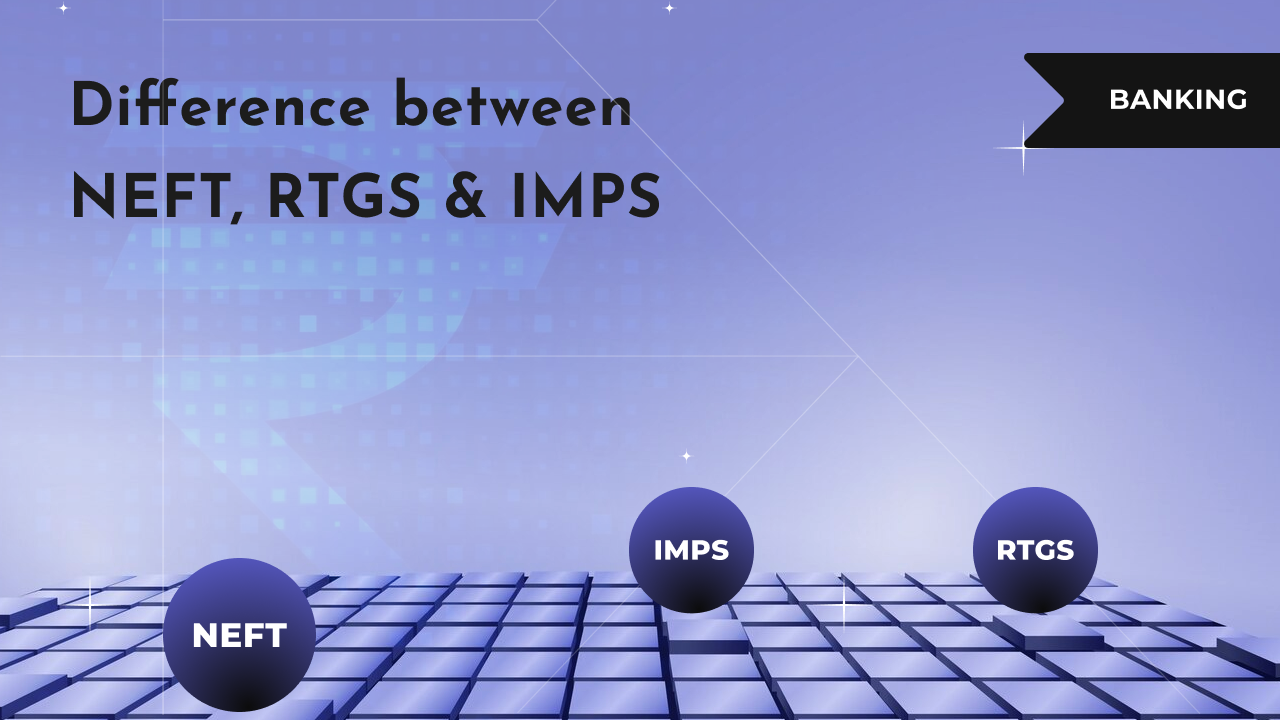In India, cash is being used less and less in favor of online transactions, especially since the demonetization. With so many options like UPI, digital wallets, and even cheques, it can be confusing to understand the difference between NEFT, RTGS, and IMPS. These three options all let you transfer money electronically, but they differ in how fast the transfer happens, how much you can send at once, and any fees involved. We'll break down these differences so you can choose the best way to transfer your money.
Difference between IMPS, NEFT, and RTGS?
When it comes to electronic fund transfers in India, speed and amount are key factors to consider. IMPS (Immediate Payment Service) is the speed demon, offering instant transfers 24/7, ideal for urgent needs. NEFT (National Electronic Funds Transfer) strikes a balance, settling transactions within a few business hours at a lower cost, making it suitable for most everyday transfers. For high-value transactions, RTGS (Real-Time Gross Settlement) is the way to go, providing instant settlement for those big-ticket purchases or critical business payments.
Differences in detail
| Basis | NEFT | RTGS | IMPS |
|---|---|---|---|
| Minimum and Maximum Transfer Values | From Rs. 1, no upper limit | Minimum Rs. 2 lakhs, no upper limit | From Rs. 1 to Rs. 5 lakhs |
| Settlement Type and Speed | Batch settlement, processed in batches | This is also Batch Settlement | Instant one-on-one settlement |
| Service Availability | 24/7 | Varies by bank hours | 24/7 |
| Mode and Process | Online and offline | Online and offline | Online and some Banks provides offline as well |
| Transaction Speed | Up to 2 hours | Within 30 minutes | Instant |
| Transaction Charges | No charges for inward; outward varies Nil to Rs. 25 | No charges for inward; outward up to Rs. 25 plus GST (Rs. 2-5 lakhs), up to Rs. 50 plus GST (above Rs. 5 lakhs) | Varies by bank and the size of the transaction |
| Reliability | Reliable and secure | Reliable and secure | Reliable and secure |
Important Things to Consider Before Initiating a Fund Transfer
Here are some crucial factors to keep in mind before starting a fund transfer:
- Fund Transfer Limits: NEFT, RTGS, and IMPS each have specific transfer limits. IMPS supports transfers up to ₹5 lakhs, while RTGS is designed for amounts over ₹2 lakhs, ideal for larger transfers. NEFT, however, has no upper limit, providing flexibility to transfer any amount as needed.
- Transfer Time: The transfer time is a key consideration. NEFT transfers might take longer, while IMPS and RTGS offer instant transfers. NEFT is suitable for non-urgent transfers, whereas IMPS and RTGS are best for immediate fund transfers. Razorpay Smart Collect can also be used for quick payments via NEFT, RTGS, and IMPS.
- Transaction Fees: The fee structure varies among NEFT, RTGS, and IMPS. NEFT usually has the lowest fees, making it cost-effective. IMPS charges are nominal, while RTGS fees range from ₹25 to ₹50 based on the transfer amount. All networks offer free inward transactions.
- GST Implications: Consider GST on transaction fees for NEFT, RTGS, and IMPS. An 18% GST is applicable on these fees, impacting the overall cost of fund transfers.
- Network Compatibility: Ensure both the sender's and receiver's banks are on the same payment network for a successful transfer. For instance, both banks must support IMPS for an IMPS transfer.
Frequently Asked Questions (FAQs)
Here are some common questions about fund transfers:
- What are the most common methods of online money transfer? The most common methods in India are NEFT, RTGS, IMPS, and UPI. NEFT is secure for bank-to-bank transfers, RTGS is for high-value real-time transactions, and IMPS and UPI offer instant transfers using mobile devices.
- Which is better: NEFT, RTGS, or IMPS? It depends on the transaction amount and urgency. NEFT is suitable for transactions under ₹2 lakhs due to its cost-effectiveness. RTGS is ideal for high-value transfers over ₹2 lakhs that need immediate settlement. IMPS is the fastest option for instant transfers.
- What is the limit of NEFT, IMPS, and RTGS per day? Daily limits vary by bank. Generally, NEFT has no daily limit, IMPS allows up to ₹5 lakhs daily, and RTGS has a minimum limit of ₹2 lakhs with no upper cap.
- Which is faster: IMPS or NEFT? IMPS is faster, providing instant transfers anytime, even on holidays. NEFT transfers are processed in batches and can take a few hours.
- How long does an RTGS transfer take? RTGS transfers are settled in real time, with funds credited within 30 minutes.
- Is RTGS available 24 hours? Yes, since December 14, 2020, RTGS services are available 24/7, including weekends and holidays.






